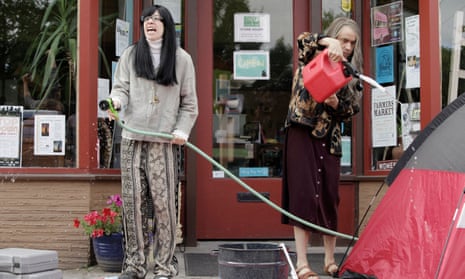On any given street in central Portland, small quirky shops offer something for everyone – craft beer, cupcakes, vintage frocks, crafting, perhaps? For Portlanders, it’s what gives the city its anti-establishment, anti-franchise identity. It’s proved fertile comedic territory for the Portlandia TV series, but it’s also given small business owners a true sense of pride in their grassroots capitalism.
Now some are worried about the future.
Earlier this month, Oregon governor Kate Brown signed a landmark bill that will increase the minimum wage to double digits by 2022. But many are calling it a “double-edged sword” for businesses and workers of both low and median incomes.
In an attempt to balance the political and socio-economic disparity between Oregon’s rural and urban regions – in a state with only four million people – the minimum wage will rise incrementally over six years in three regions: rural areas will increase to $12.50, mid-sized counties to $13.50, and its largest city, Portland, to $14.75.
Jessie Burke is concerned about the impact it might have on her business, Posies Bakery & Cafe, in North Portland. “Small businesses like mine are frequently communicated with as if we were a Fortune 500 operation, but we are not,” she said. “When wages go up, prices have to go up. There’s no margin to absorb that cost.”

Photograph: Alamy
Burke says commercial districts, employees and the Portland community have to share the burden when they rally for the greater good. “If we can all get there, I’m thrilled to see my staff receive higher wages.”
Fourteen states have increased their minimum wage since January 2014, and Oregon’s current $9.25 an hour is already among the most generous. The new bill will make it the highest in the nation.
The Obama administration, a proponent of raising the federal floor, applauded Oregon lawmakers, who passed the bill close to party lines.
A statewide survey conducted recently for Oregon Public Broadcasting (OPB) found that voters, too, were divided over the tiered minimum wage increase, with 48% in favor and 46% opposed.

The hotly debated minimum wage increase aims to give working families a shot at economic security, while easing businesses into the increase. And its unprecedented three-tier structure might prove to be a worthy experiment from which wage hike supporters and cynics alike can glean data.
Oregon has a steady track record of raising its minimum wage to adjust for inflation. In 1998, the legislature increased the minimum wage 42% over 18 months.
“There’s a substantial body of research that shows minimum wage increases have had little or no impact on jobs, either positive or negative,” said Juan Carlos Ordóñez, communications director at the Oregon Center of Public Policy (OCPP).
It’s no secret that low-wage employment is replacing jobs that used to pay a middle-class salary. Minimum wage is no longer for those entering the workforce. Recent data from the Center for Economic and Policy Research shows that only 12% of minimum wage workers are teenagers. In Oregon, the average minimum wage employee is a 35-year-old woman, revealed a report by the University of Oregon’s Labor Education and Research Center (LERC).
Oregon has one of the highest percentages of workers receiving state assistance, reports the study, with more than 1 million Oregonians (a quarter of the population) relying on food stamps to feed their families. A worker must make $16.28 an hour to afford a two-bedroom apartment in Oregon, according to the National Low Income Housing Coalition.
Yet while workers outside of urban areas are more likely to end up in low-wage positions, a great many Portlanders – often overeducated and underemployed in service industry and retail jobs – are grappling to stay afloat in a city Governing magazine labeled as America’s most rapidly gentrifying.
That’s one of many reasons why Justin Norton-Kertson initially launched 15 Now, a campaign to raise Portland’s minimum wage to $15 an hour. The initiative was suspended after the new wage increase was signed into law.
Though Norton-Kertson believes the legislature’s bill is an important step, “unfortunately, this new minimum phases in so slowly that it completely fails to create a living wage and bring working families in Oregon out of poverty, which was the ultimate goal of the $15 campaign”.
When Portland reaches close to $15 an hour, a full-time barista at Posies Bakery & Cafe will make $40,000 a year, with tips.
But that’s fair, say supporters. Portland is becoming another unaffordable city on the west coast, and wages must meet the high cost of living. Seattle is working its way towards $15 over the next few years, and San Francisco’s minimum wage paychecks will climb to $15 by 2018.
Minimum wages have proved a controversial topic among local officials across the nation. In February, the Alabama legislature blocked Birmingham’s approval to raise the minimum wage from $7.75 to $10.10. Nevertheless, 23 local governments have increased wages above their state minimum.
While the OCPP said Oregon’s regionally tiered minimum wage hike is logical, ultimately, wage levels should be left in the hands of local government. “We would have preferred to see a strong minimum wage increase across the state and then lift the pre-emption of local cities and governments from moving higher,” said Ordóñez at the OCPP. Similar to Alabama, Oregon law prevents local governments, cities and counties from raising the wage higher than the state minimum wage.
With the state steering the ship, several Oregon industries are expecting job loss.
The Oregon Farm Bureau staunchly opposed the minimum wage hike, arguing that Oregon’s labor-intensive produce will be phased out, and with it businesses and workers.
Universities across the state are projecting heavy budget balancing to keep part-time student jobs open. Oregon State University (OSU) estimated that payroll expenses due to the minimum wage increases will exceed $8.2m by 2021.

Anthony Smith, the Oregon state director of the National Federation of Independent Business, said the bill was not a fair compromise and “probably should have been referred to the ballot so that Oregon voters could have had the opportunity to weigh in”.
Jason Brandt, CEO of the Oregon Restaurant and Lodging Association, believes the wage hike “creates significant unintended consequences”, citing reduced work hours, inflated costs for customers, and increased layoffs.
“If we want to tackle poverty in Oregon the worst thing we could do is hand over pink slips to people who need income for their livelihoods,” said Brandt.
Several chambers of commerce in rural areas believe they will get hit the hardest, and are preparing for serious belt tightening. “Likely the result will be that small businesses will have to reduce or eliminate positions entirely in order to maintain budget,” said Tallulah Chiono, executive director at Lake County Chamber of Commerce in rural south-central Oregon.
But crying “job loss” is purely alarmist, according to Gordon Lafer, political economist and associate professor at the University of Oregon’s LERC, who says decades of research cannot link increasing minimum wages to increasing unemployment.
Nevertheless, “small businesses generally lack the resources to protect themselves through this transition”, said Katrina Scotto di Carlo of Supportland, a rewards sharing network of independent businesses in Portland.
She said locally owned businesses, on average, contribute to income growth in their communities. “We need to ensure this does not become another story where those that contributed greatly to the problem, like large corporations, have the resources to succeed while those in the business of alleviating the problem – locally owned businesses – fail,” she continued.
Scotto di Carlo believes Governor Brown’s recently appointed small business advisory cabinet will probably be faced with the challenge of assisting businesses in Portland and beyond. “We all must adopt the mindset that if one small business fails because of this wage increase, then Oregon has failed that community.”
